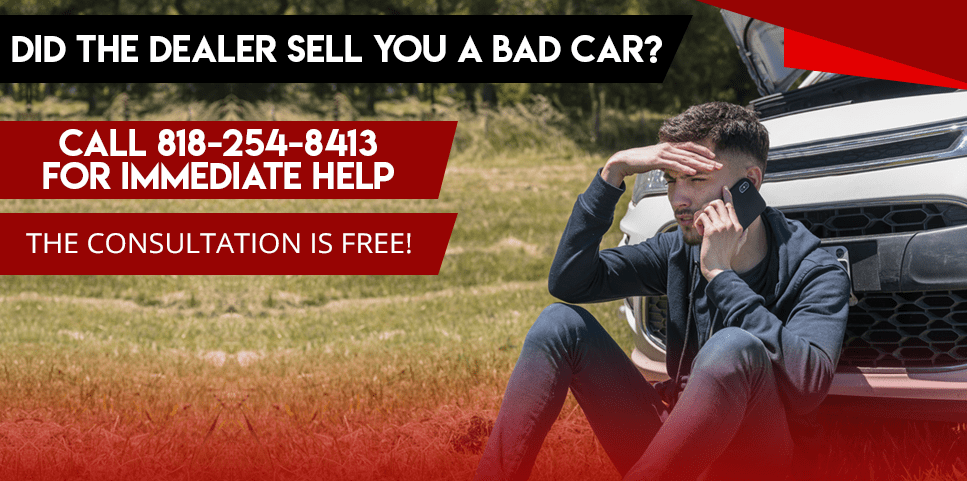
When you purchase a used car, you expect transparency from the dealer about the vehicle’s history and condition. One crucial aspect that dealers must disclose is unibody damage. This type of damage, often resulting from major accidents, can significantly impact a car’s safety and value. At Consumer Action Law Group, we believe it’s essential for California consumers to understand what unibody damage is and their rights if a dealer fails to disclose this information.
Unibody damage affects the car’s frame, potentially weakening its overall structure. While some repairs can be made, a vehicle with unibody damage may be more vulnerable in future accidents. This is why California law requires used car dealerships to inform buyers about any known unibody damage before a sale is completed. This disclosure is not just a matter of transparency—it’s a legal obligation designed to protect consumers.
If a dealer sells you a car with undisclosed unibody damage, you may have grounds for legal action. This failure to disclose important information about the vehicle’s condition is considered a form of auto fraud. As a buyer, you have the right to make an informed decision about your purchase, and withholding information about unibody damage deprives you of that right. In such cases, consumers can seek legal remedies to address this violation of their consumer rights.
Identifying Unibody Damage in Your Vehicle
Even if a dealer doesn’t disclose unibody damage, it doesn’t mean your car is free from such issues. Sometimes, damage to a car’s frame isn’t immediately visible to the untrained eye. A vehicle might look pristine on the surface, yet have underlying structural problems. This is why many buyers don’t discover unibody damage until after they’ve driven the car for some time.
There are some signs that might indicate your car has hidden unibody damage:
- Uneven handling: If your car consistently pulls to one side while driving, it could be a sign of frame misalignment.
- Frequent repairs: Recurring mechanical issues or the need for constant repairs might be linked to previous structural damage.
- Unusual tire wear: Uneven or rapid tire wear can indicate alignment problems often associated with frame damage.
If you suspect your car might have undisclosed unibody damage, it’s advisable to have it inspected by a reputable body shop. These professionals can perform a thorough assessment of your vehicle’s frame, even if the car’s history report doesn’t show any previous accidents.
Remember, a clean vehicle history report doesn’t guarantee the absence of unibody damage. Some accidents may go unreported, or repairs might have been made without proper documentation. That’s why a professional inspection can provide valuable insights into your car’s true condition.
Legal Rights and Options for Consumers
California law provides strong protections for car buyers, especially when it comes to undisclosed vehicle damage. If you’ve purchased a car with unibody damage that the dealer failed to disclose, you have several legal rights and options available to you.
Firstly, it’s important to understand that dealers are legally required to inform buyers about any known significant damage to a vehicle, including unibody issues. This requirement is part of California’s consumer protection laws, designed to ensure fair and transparent transactions in the used car market.
If a dealer has violated this obligation by not disclosing unibody damage, their actions may be considered auto fraud. In such cases, you as the buyer have the right to take legal action. Your options may include:
- Contract cancellation: You might be able to cancel the purchase and return the car for a full refund.
- Compensation: You could seek damages to cover the diminished value of the vehicle or costs of necessary repairs.
- Replacement: In some cases, you may be entitled to a replacement vehicle of similar value without the undisclosed damage.
The specific remedy available often depends on factors such as the extent of the damage, how long you’ve owned the car, and whether the dealer’s actions were intentional or negligent.
It’s worth noting that California’s lemon law might also apply in certain situations, particularly if the undisclosed unibody damage leads to persistent issues that the dealer fails to fix after multiple attempts.
If you find yourself in this situation, it’s advisable to consult with a consumer protection attorney who specializes in auto fraud cases. They can provide detailed guidance on your rights and help you navigate the legal process to seek appropriate remedies.
Remember, the law is designed to protect consumers from deceptive practices in car sales. Don’t hesitate to assert your rights if you believe you’ve been misled about the condition of a vehicle you purchased.
Steps to Take If You Suspect Undisclosed Unibody Damage
If you believe your recently purchased car has undisclosed unibody damage, it’s crucial to act promptly and methodically. Here are the key steps you should take:
- Document the issues: Start by keeping a detailed record of any problems you’ve noticed with the car’s performance, handling, or appearance that might indicate unibody damage.
- Get a professional inspection: Take your vehicle to a certified mechanic or body shop specializing in frame inspections. They can provide a thorough assessment and documentation of any unibody damage.
- Collect all paperwork: Gather all documents related to the purchase, including:
- The sales contract
- Any warranties provided
- The vehicle history report given at the time of sale
- Service records, if any
- Communicate with the dealership: Reach out to the dealership in writing about your concerns. Keep copies of all correspondence. This creates a paper trail and may be useful if legal action becomes necessary.
- Take photos and videos: If there are visible signs of damage or issues with the car’s performance, document these with clear photos and videos.
- Get repair estimates: If damage is confirmed, obtain written estimates for the necessary repairs from reputable body shops.
- Review your purchase agreement: Check the terms of your purchase agreement for any clauses related to vehicle condition or seller disclosures.
- Consider a second opinion: If possible, get a second professional inspection to confirm the findings of the first.
- Research the vehicle’s history: Obtain a comprehensive vehicle history report if you haven’t already. Compare this with the information provided by the dealer at the time of sale.
- Consult a legal professional: If you’ve confirmed undisclosed unibody damage, consider speaking with an attorney who specializes in auto fraud cases. They can advise you on your legal options and the best course of action.
Remember, time is often of the essence in these situations. The sooner you act, the stronger your position will be if you need to pursue legal remedies. By following these steps, you’ll be well-prepared to address the issue, whether through negotiations with the dealer or through legal channels if necessary.
The Impact of Unibody Damage on Vehicle Value
Unibody damage can have a significant and lasting effect on a vehicle’s value, often more than many buyers realize. Understanding these impacts is crucial for anyone who has purchased or is considering buying a used car.
Firstly, unibody damage typically leads to a substantial decrease in a car’s market value. Even after repairs, a vehicle with a history of frame damage may be worth 30% to 70% less than a comparable undamaged car. This reduction stems from the compromised structural integrity and the potential for long-term issues.
The resale value of a car with unibody damage is also considerably affected. Many potential buyers are wary of vehicles with a history of frame damage, making these cars harder to sell. When they do sell, it’s often at a much lower price point than similar models without such damage.
Insurance companies take unibody damage very seriously. If your car has a history of frame damage:
- Your insurance premiums may increase
- Some insurers might limit the types of coverage available
- In the event of another accident, the car is more likely to be declared a total loss
Safety is another critical factor that impacts a vehicle’s value. Cars with previous unibody damage may not perform as well in subsequent collisions, potentially putting occupants at greater risk. This safety concern further diminishes the car’s perceived value.
Additionally, unibody damage can lead to ongoing mechanical issues. Misalignment can cause uneven tire wear, steering problems, and increased stress on various components. These issues can result in higher maintenance costs over time, another factor that decreases the car’s overall value.
It’s worth noting that the extent of the value reduction can vary based on factors such as the severity of the damage, the quality of repairs, and the specific make and model of the vehicle. However, in almost all cases, unibody damage will have some negative impact on a car’s value.
Given these significant financial implications, it’s clear why undisclosed unibody damage is such a serious issue. If you’ve purchased a car with undisclosed frame damage, you may have paid considerably more than the vehicle’s true value, highlighting the importance of dealer disclosure and thorough pre-purchase inspections.
Preventing Unibody Damage Issues When Buying a Used Car
When shopping for a used car, taking proactive steps to identify potential unibody damage can save you from future headaches and financial losses. Here are some key strategies to help you avoid purchasing a vehicle with undisclosed frame issues:
- Request a comprehensive vehicle history report: Always ask for a detailed report from services like Carfax or AutoCheck. While these reports may not catch everything, they can reveal accidents or damage that might have affected the car’s frame.
- Have an independent inspection: Before finalizing any purchase, have the car inspected by a trusted, independent mechanic. Specifically request that they check for signs of unibody damage. This step is crucial even if the car looks perfect on the surface.
- Ask direct questions: Don’t hesitate to ask the dealer pointed questions about the car’s history. Inquire specifically about any accidents, repairs, or frame damage. If possible, get their responses in writing.
- Look for visual clues: While not foolproof, visually inspect the car for signs of major repairs. Look for inconsistencies in paint color, panel gaps, or signs of overspray.
- Test drive thoroughly: During the test drive, pay attention to how the car handles. Any pulling to one side, unusual noises, or vibrations could indicate frame issues.
- Check for consistent wear: Examine the tires for uneven wear patterns, which can be a sign of alignment problems potentially related to frame damage.
- Verify documentation: Ensure all promises and representations about the car’s condition are included in the sales agreement. This documentation can be crucial if issues arise later.
- Consider certified pre-owned vehicles: While not a guarantee, certified pre-owned programs often include thorough inspections that might catch frame damage.
- Research the model: Some car models are more prone to certain types of damage. Knowing this can help you be extra vigilant during your inspection.
- Trust your instincts: If something feels off about the car or the deal, don’t be afraid to walk away. There are always other options in the used car market.
Remember, while these steps can help you avoid many issues, they’re not foolproof. If you’re not comfortable assessing a car’s condition yourself, consider bringing along a knowledgeable friend or hiring a professional car buying service. Your diligence in the buying process is your best defense against undisclosed unibody damage and other potential issues with used cars.
The Role of Consumer Protection Attorneys
When dealing with undisclosed unibody damage, consumer protection attorneys can be invaluable allies in your pursuit of justice. These legal professionals specialize in auto fraud cases and possess the expertise to navigate the complex landscape of consumer rights and dealership obligations.
If you find yourself in a situation where you suspect or have confirmed undisclosed unibody damage, here’s how a consumer protection attorney can assist you:
- Case Evaluation: An attorney can review your situation, examine the evidence, and determine if you have a valid legal claim against the dealership.
- Legal Strategy: Based on the specifics of your case, they can develop a tailored legal strategy to pursue the best possible outcome for you.
- Negotiation: Attorneys can engage in negotiations with the dealership on your behalf, often achieving better results than consumers can on their own.
- Documentation: They can help gather and organize all necessary documentation to support your claim, including repair estimates, inspection reports, and correspondence with the dealer.
- Legal Proceedings: If a settlement can’t be reached through negotiation, your attorney can file a lawsuit and represent you throughout the legal process.
- Knowledge of Laws: Consumer protection attorneys stay up-to-date with the latest laws and regulations, ensuring your case is handled in compliance with current legal standards.
- Maximizing Compensation: They can help you understand what forms of compensation you may be entitled to, such as refunds, repairs, or damages for fraud.
- Dealing with Insurance Companies: If insurance issues arise due to the undisclosed damage, your attorney can interact with insurance companies on your behalf.
- Peace of Mind: Having a knowledgeable professional handle your case can reduce stress and allow you to focus on your daily life while the legal process unfolds.
- Consumer Education: Throughout the process, your attorney can help you understand your rights, empowering you to make informed decisions.
It’s important to note that many consumer protection attorneys offer free initial consultations and may work on a contingency fee basis, meaning you only pay if they win your case. This can make legal representation more accessible to consumers facing auto fraud issues.
Remember, time can be a critical factor in these cases. If you suspect you’ve been sold a car with undisclosed unibody damage, consulting with a consumer protection attorney sooner rather than later can help protect your rights and potentially lead to a more favorable outcome.
Safeguarding Your Rights: The Road Ahead for Informed Car Buyers
Understanding your rights regarding unibody damage is crucial when buying a used car in California. Dealers have a legal obligation to disclose this information, and failure to do so is a serious matter. By being informed and vigilant, you can protect yourself from potential fraud.
Remember, if you suspect you’ve been sold a car with undisclosed unibody damage, you have options. Don’t hesitate to seek professional legal advice to explore your rights and potential remedies. With the right knowledge and support, you can navigate these challenging situations and work towards a fair resolution.












